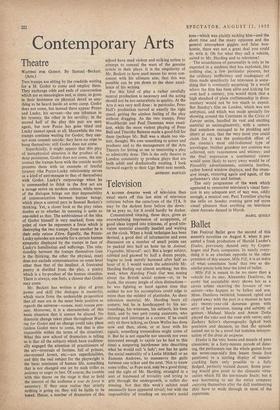Television
A RATHER drearier week of television than usual starts off this last stint of television criticism before the cataclysm of the ITA. It may be the darkest hour before the dawn : let us pray so, for it could hardly be darker.
Concentrated viewing, these days, gives an overwhelming impression of scrappiness, of good ideas lopped into triteness, of good tele- vision material absurdly hustled and waiting on the clock. When a brisk technique has been devised, a good deal of information and even discussion on a number of small points can be packed into half an hour (as in Animal, Vegetable, Mineral?, say). But a larger subject, nibbled and gnawed by half a dozen people, begins to look merely harassed after half an hour of it. I would watch the admirable Mr. Harding finding out almost anything; but this week, when Harding Finds Out was nosing about the British social system—or, to be frank, the steamy jungle of class distinctions— he was lighting so hard against time that neither he nor his accomplices could edge in more than the mildest of platitudes. As sheer television material, Mr. Harding beats all comers; but he is handicapped by his sur- roundings, his witnesses, his subjects, his time limit, and by two pert young assistants, who chirrup and interrupt in a corner. If he could only sit there talking, as Orson Welles has done now and then, alone, or at least with his equals, something tremendous might come of it. But he is not equable nor smooth nor even interested enough to cajole (as he had to this time) a simpering hairdresser into describing what he would call 'a lady'; nor has he quite the social neutrality of a Leslie Mitchell or an Eamonn Andrews, to manoeuvre the gulfs between one talker and the next. 'Not to know some trifles,' as Pope said, may be a good thing; and the sight of Mr. Harding, strangled in a sort of bindweed of triviality and trying to grin through the undergrowth, is rather dis- tressing. Not that this week's subject need necessarily have appeared trivial; but with the impossibility of treading on anyone's social toes—which was plainly racking him—and the short time and the many opinions and the general atmosphere giggles and false bon- homie, there was not a great deal you could do with it. Oh for what they call a vehicle, suited to Mr. Harding and to television!
The scratchiness of personality is only to be expected in a medium that has exploited, like nothing else, a few particular persons; but the ordinary inefficiency and inadequacy of films made specifically for television is some- thing that is constantly surprising. In a world where the film has been alive and kicking for over half a century, you would think that a high standard of plain craftsmanship in docu- mentary would not be too much to expect. But Sunday's film on London, which was not untypical, and which was made specially for showing around the Continent in the Cities of Europe series, handled its vast and exciting material so unimaginatively, with a camera that somehow managed to be plodding and jittery at once, that the very most you could claim for it was the postcardish effect of the cinema's most old-fashioned type of travelogue. Neither grandeur nor cosiness was achieved, only raucousness and whimsy; and the final impression a continental viewer would seem likely to carry away would be of Piccadilly advertisements, cafeteria lunches, rather horrid window displays, and the obses- sive image, recurring again and again, of the policeman's chin and helmet.
The only programme of the week which appeared to remember television's visual func- tion in any adequate sort of way was, oddly enough, a musical one. Paul Tortellier playing the cello on Sunday evening gave me more visual pleasure than anything on television since Antonio danced in March.
ISABEL QUIGLY


































 Previous page
Previous page